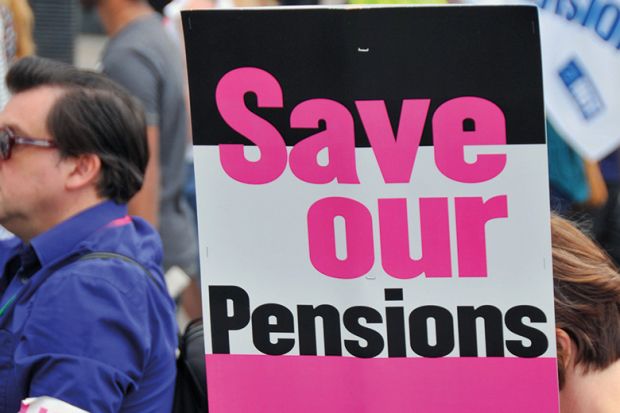University staff have moved a step closer to a national strike after a consultative ballot by the University and College Union showed overwhelming support for industrial action to protect pensions.
Asked if they would be willing to walk out over cuts to the Universities Superannuation Scheme, some 87 per cent of UCU members said that they would, the union announced on 19 October.
A total of 22,473 staff voted in the national poll, which represents 55.8 per cent of members – a huge turnout for this type of consultative ballot by a union.
It follows growing anger about potential changes to the UK university sector’s main pension scheme, which has about 400,000 members.
Having estimated a £5 billion deficit in 2017, the pension provider has put forward proposals that would see employers and staff pay an extra 6 to 7 per cent of salary more to staff pensions, costing an extra £500 million a year more from the sector’s payroll.
Universities currently pay 18 per cent of salary for USS members, while individuals must contribute 8 per cent towards the scheme, which has closed its final-salary arrangements.
Several universities – including the University of Southampton and Imperial College London – have signalled that they are unwilling to stump up more to cover the increased costs of pensions and want to move to a defined contribution scheme, where pension incomes are wholly dependent on stock market performance rather than guaranteed.
Many university staff have also argued that the USS’ valuation of its deficit is too gloomy and that it should take a longer-term approach and place less emphasis on the current low gilt yields, which has pushed up the scheme’s liabilities.
In its statement, the UCU said that industrial action would lead to disruption for thousands of students. Union members may also be asked to vote on a refusal to cooperate with government initiatives such as the teaching excellence framework, the research excellence framework and the National Student Survey.
“This result sends a clear message that UCU members are prepared to take sustained industrial action in order to protect their pensions,” said Sally Hunt, the UCU’s general secretary.
“USS members work at some of the most celebrated universities in the UK, and yet their pension benefits are the worst in the sector. Further cuts in benefits will only make this situation worse.”
Ms Hunt added that staff were “totally fed up with being treated poorly by employers who seem only to be interested in defending their own sky-high salaries and bloated pension pots”.
“The employers need to act now to avoid a major, damaging dispute at time when universities are already in the news for all the wrong reasons,” she added.
Pension negotiations with Universities UK, the representative body for universities, have resumed this week. UUK told the Financial Times on 11 October that the Pensions Regulator’s view “makes it clear” that USS pension costs and risk “have to be controlled”.
“The deficit and scale of future costs are sizeable, making benefit reform necessary,” said Alistair Jarvis, chief executive of UUK.
Commenting on the UCU ballot result, Mr Jarvis said that universities “recognise that the prospect of pension scheme benefit reform will concern employees, but failure to act now risks harming our world-class higher education system”.
“Challenging economic circumstances have resulted in USS having a large deficit, and the cost of funding future pensions has risen to an unaffordable level,” he said.
“Universities can’t afford to pay more into pensions without diverting money from teaching and research, which will damage the high standards that students rightly expect,” Mr Jarvis added.




